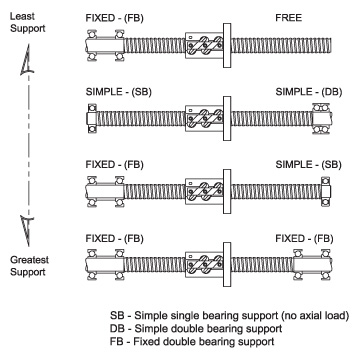The general answer I would give anyone, working on any project, who asked this question:
Should I buy commercially available, off-the-shelf (COTS) parts, or make my own?
would be to always buy off-the-shelf parts unless you have a really, really good reason to make your own. Here's why:
- Making whatever other parts (ballscrews, in your case) isn't the purpose of your project. All the other points here are just reinforcing the fact that making your own parts is going to turn into a distraction.
- You don't have volume discounts. Most of the cost for getting parts made is the conversion from CAD to gcode or other machine programming, making jigs, setting machine stops, etc. These costs are fixed and you pay them regardless of the part quantity you order, so someone that orders 1,000 parts gets to amortize the machining setup cost across a larger number of items, resulting in a lower per-part cost. The cost to you to get 3 items made is sometimes nearly the same as the cost to you to get 10 parts made.
- You're probably not a geometric dimensioning and tolerancing expert. Are your clearances specified correctly such that you get smooth motion without slop/backlash? Is there clearance for a lubricant? Are your hole positions and screw clearances specified correctly such that the resulting assembly will bolt together? Are they specified correctly such that it bolts to your project?
- You're probably not a machine design expert. Are your leadscrew angles correct for your desired torque, force, and speed requirements? Are you taking material friction into account? Are you taking into account radial loading or bending? Are you taking viscous friction due to the lubricant into account? Are your material selections going to cause galvanic corrosion? Is the leadscrew minor diameter appropriate for your axial and bending forces? Are the fillets in your leadscrew threads sufficient to avoid stress concentration?
- You're probably not a drafting expert. Did you forget to indicate the setscrew hole should be tapped? Did you forget to include a grease fitting? Did you change the motor last minute and forget to update the bolt pattern for the mating flange? Are your units correct?
If you mess up anything in points 3, 4, or 5, you wind up with a fancy paperweight. Because of point 2, you paid a lot for it. Because of point 1, the rest of your project is stalled until you get these issues resolved.
So you wind up fixing the problem you did notice, re-order the part(s), wait for fabrication and shipping, just to potentially discover either (1) issues you didn't notice that were already present in the first batch, or (2) issues that you introduced when resolving the issue(s) with the first batch.
I've done this. A lot. It will be a lot easier for you to identify the specs you need, then find the commercially-available part that just exceeds the performance specs you need. This may wind up adding weight, so then you need a bigger motor, which then means you need a different ballscrew, or whatever, but in this case you're not having to worry about part fabrication, durability, testing, etc. You just buy the parts and put them together. If there's a problem with the part quality, you send it back to the vendor and use a replacement.
So again, to summarize - if it's not the focus of your project, don't do it. If you want to learn to make a ballscrew, then you should put everything else aside and accept the fact that making a ballscrew is your new project. If you can't afford (time or money) to make that commitment then outsource it. Let the ballscrew manufacturers worry about design, production, and quality, and you focus on whatever novel thing you're trying to do with them.
This goes for professional companies, too - Ford doesn't make airbags, even though airbags are in all their vehicles, they buy them from an airbag supplier. A carpenter doesn't make their own lumber, they buy it from a lumber supplier. A chef doesn't make their own flour, etc. The only exceptions you'll find to any line of thinking like this will be cases where the person/company believes the specifications they want aren't commercially available, but that's the mindset you (and professional companies) need to take with decisions like this - buy the commercially available stuff until you can prove that whatever item isn't commercially available. Only then should you take on trying to do it yourself.
